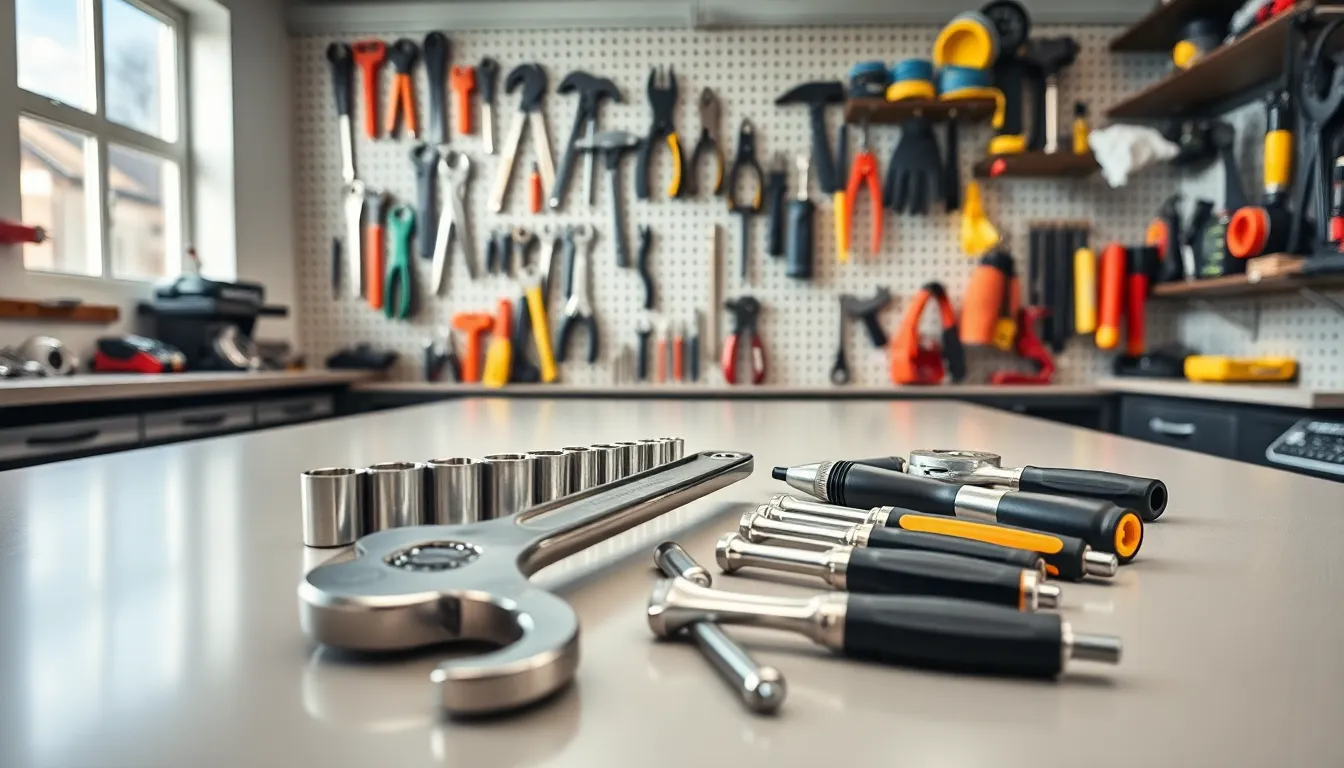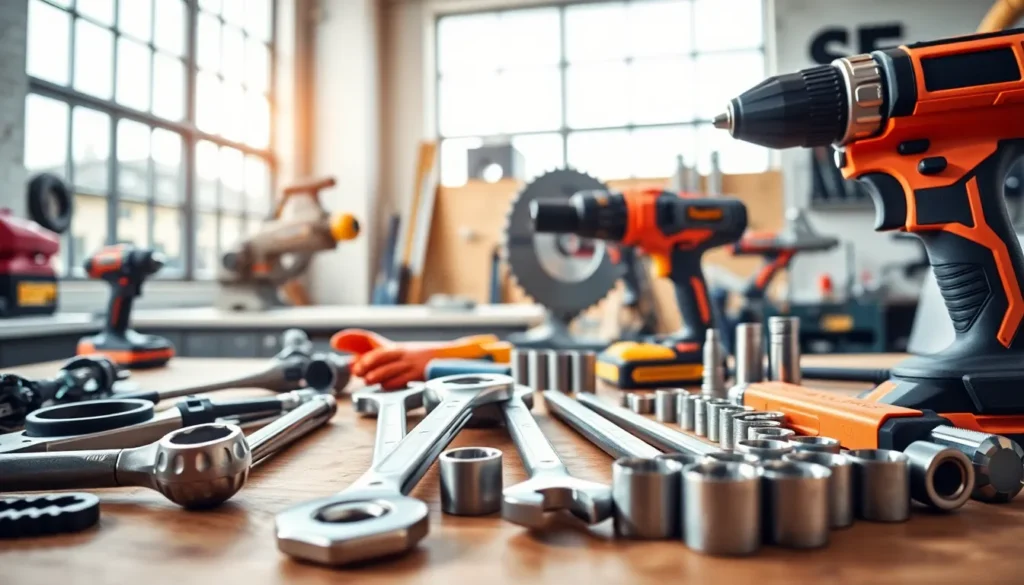Table of Contents
TogglePicture this: you walk into a mechanical workshop, and it feels like stepping into a treasure chest for DIY enthusiasts. Every tool has its own story, waiting to be unleashed in the pursuit of turning raw materials into masterpieces. Whether you’re a seasoned mechanic or a weekend warrior, having the right mechanical workshop tools can turn even the most mundane tasks into a thrilling adventure. Let’s jump into the must-haves that ensure your workshop is equipped for success, minus the chaos or that “where did I put that wrench?” panic.
Essential Hand Tools for Every Workshop

Every workshop needs a solid foundation, and nothing lays that groundwork better than essential hand tools. These trusty companions are straightforward, yet versatile, to tackle a variety of tasks. Here are some of the must-have hand tools that every workshop should not be without:
Wrenches and Sockets
Wrenches come in many shapes and sizes, but the adjustable wrench, the ratchet wrench, and a complete socket set can cover almost every type of fastener. From tightening bolts on a car to assembling furniture, these tools are your first line of defense.
Screwdrivers
No workshop is complete without a good selection of screwdrivers. This includes flathead and Phillips screwdrivers, as well as a few specialty types for those tricky screws that seem to have been designed by a sadistic engineer.
Pliers
Whether it’s gripping, twisting, cutting, or snipping, pliers are indispensable. Needle-nose pliers are excellent for those tight spaces, while combination pliers can handle a variety of tasks with ease.
Hammers
The classic hammer is an absolute must. Traditionally, a claw hammer is ideal for driving nails and pulling them out. For heavier tasks, consider adding a sledgehammer to your arsenal.
Tape Measures
Precision is key in any mechanical try, which is where a tape measure comes into play. Look for a durable, retractable tape with clear markings.
Safety Gear
While not a tool per se, investing in safety glasses, gloves, and ear protection is crucial. Safety should always be the priority in any workspace.
Power Tools: A Game Changer in Workshop Efficiency
Ah, power tools, those magical devices that transform hours of labor into minutes of productivity. They are truly a game changer and can revolutionize the way tasks are approached in a mechanical workshop. Here are some power tools that can catapult your efficiency into the stratosphere:
Drills
A drill is indispensable for any mechanical workshop. Corded or cordless, these tools can create holes in wood, metal, or plastic, depending on the bits you use. Look for models with adjustable speeds for optimal control.
Saws
From band saws to circular saws, the right saw can make precise cuts smoother than butter on a hot day. Invest in a quality miter saw if you’re cutting angles.
Grinders
A grinder can smooth and shape various materials, making it essential for both finishing and sharpening tasks. Whether using an angle grinder for quick tasks or a bench grinder for finesse, this tool can breathe new life into worn-out components.
Sanders
Sanding surfaces for a perfect finish is a breeze with power sanders. Orbital and belt sanders each have their place, allowing for rapid material removal and smooth surfaces. Combining different types ensures a flawless result.
Impact Drivers
Need to drive screws fast? An impact driver will do the job in a blink. These compact powerhouses let you work quickly without sacrificing power, making them invaluable for assembling or disassembling.
Specialized Tools for Advanced Applications
Once the basics are covered, it’s time to venture into the realm of specialized tools. Tailored for specific applications, these tools can elevate your workshop game:
Torque Wrench
An absolute must for automotive work, a torque wrench ensures that bolts are tightened to the correct specifications. This tool takes the guesswork out of the equation and prevents costly mistakes.
Diagnostic Tools
In the world of mechanics, diagnostic tools can save time and money. OBD-II scanners can help identify issues in vehicles quickly, allowing mechanics to address problems before they escalate.
Welding Equipment
For those looking to fabricate or repair metal parts, welding equipment could be the ultimate addition. Whether it’s MIG, TIG, or arc welding, this specialized equipment opens up endless possibilities in metalwork.
Specialty Hand Tools
Do you work with fine electronics? Consider investing in specialized tools like precision tweezers and small screwdrivers. For woodworkers, dedicated chisels and gouges can make a world of difference in the details.
Maintenance and Care for Your Tools
Having the right tools is one thing: keeping them in peak condition is another challenge entirely. Maintenance is crucial to prolonging the life of workshop tools:
Cleaning
Regular cleaning removes debris, dust, and grease that accumulate with use. Use compressed air for hard-to-reach areas, and wipe down surfaces with a cloth after each job.
Storage
Proper storage ensures that tools remain organized and accessible. Wall-mounted pegboards, toolboxes, and magnetic strips can help maintain order in even the busiest workshops.
Regular Inspection
Performing regular checks can prevent tool failure mid-project. Inspect for rust, cracks, or wear and tear, and replace parts as necessary to keep everything running smoothly.
Safety Practices in the Mechanical Workshop
Safety should be front and center in any mechanical workshop. Here are practices that can help minimize risks:
Personal Protective Equipment (PPE)
Always wear appropriate safety gear including goggles, gloves, and dust masks. Make it a rule to put these on before starting any work.
Clear Workspaces
An organized workspace can prevent accidents. Clear away clutter and ensure ample room to work safely around machinery and tools.
Stay Informed
Regularly review safety procedures for the specific tools and equipment being used. Training and understanding can be the difference between a safe experience and a workshop accident.
Choosing the Right Tools for Your Needs
Investing in the right tools is a significant step toward enhancing workshop productivity. Consider the following factors when selecting your tools:
Evaluate Your Workload
What projects will you tackle most often? Understanding your needs will guide you toward purchasing tools that make the most impact based on your specific tasks.
Budget Constraints
Quality tools can be a bit pricey, but opting for the cheapest option often leads to frustration down the line. Strike a balance between your budget and the quality of the tools.
Brand Reputation
Research brands renowned for durability and performance. Reading reviews and asking fellow mechanics can help you identify tools that will last and perform well.





